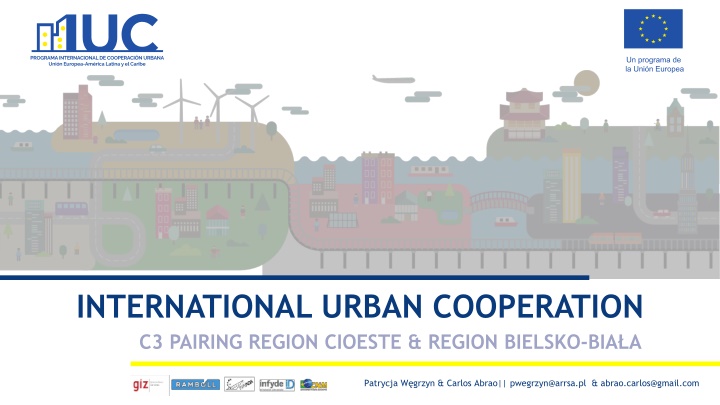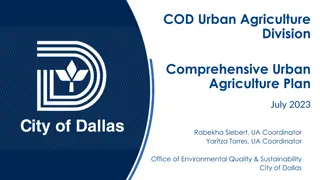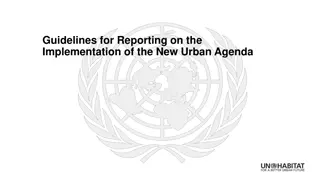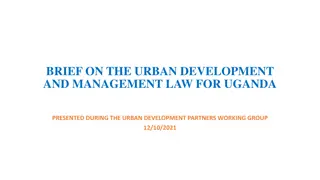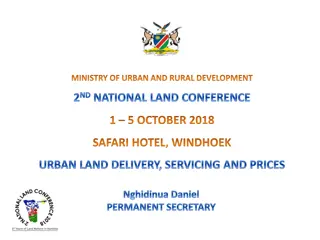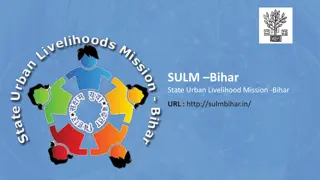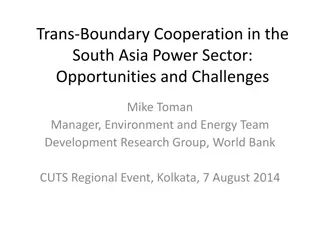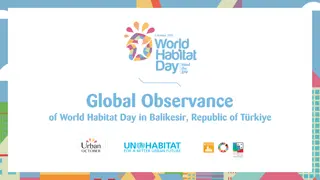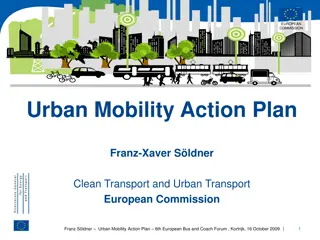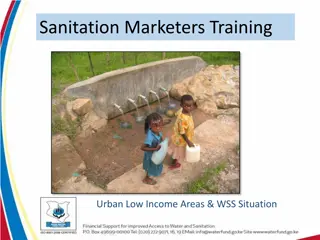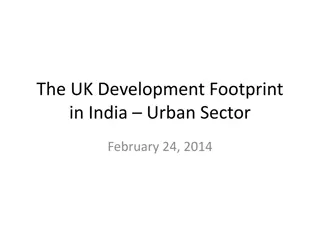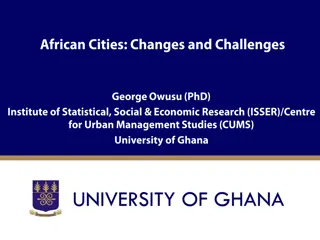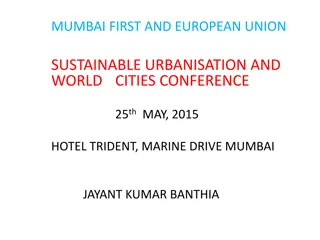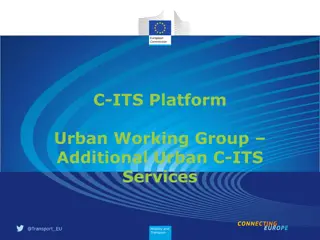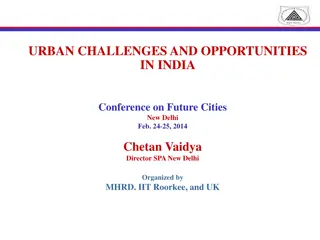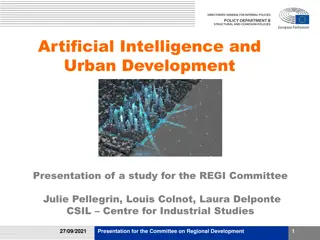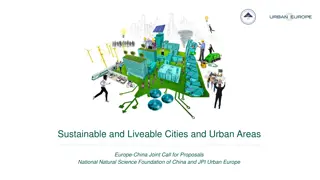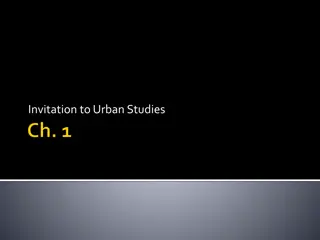INTERNATIONAL URBAN COOPERATION
Establishing cooperation for economic development in the ICT sector to promote internationalization of companies from Cioeste and Bielsko-Biaa regions, targeting Brazilian and Polish markets for broader access in Latin America and Europe.
Download Presentation

Please find below an Image/Link to download the presentation.
The content on the website is provided AS IS for your information and personal use only. It may not be sold, licensed, or shared on other websites without obtaining consent from the author.If you encounter any issues during the download, it is possible that the publisher has removed the file from their server.
You are allowed to download the files provided on this website for personal or commercial use, subject to the condition that they are used lawfully. All files are the property of their respective owners.
The content on the website is provided AS IS for your information and personal use only. It may not be sold, licensed, or shared on other websites without obtaining consent from the author.
E N D
Presentation Transcript
INTERNATIONAL URBAN COOPERATION C3 PAIRING REGION CIOESTE & REGION BIELSKO-BIA A Patrycja W grzyn & Carlos Abrao|| pwegrzyn@arrsa.pl & abrao.carlos@gmail.com
OUTLINE 1 3 5 7 2 4 6 8 MAIN MILESTONES PAIRING OBJECTIVE PRIORITIES TRANSFORMATIVE ACTIVITIES KEY ACTIONS TIMELINE LESSONS LEARNED DOS & DON TS
PAIRING OBJECTIVE
PAIRING OBJECTIVE Establish cooperation for economic development in the area of ICT to promote internationalisation of companies from both regions to use the two regions as HUBs to access the Brazilian and Polish markets to open the Latin America and European markets to both regions
MAIN MILESTONES
MILESTONES Before the first mission in Poland: drafting the cooperation Kick of meeting Brussels, November 2017: definition of the mutual intrest and area of cooperation SWOT analysis of the state of the art: how does the ICT sector looks like in both regions? questionnaire First official online conference: city education business representatives from both regions Working in regions: assesment of the questionnaire, indication of firms to be involved in the project Niches of cooperation: clarification of the areas of mutual intrest
MILESTONES First mission in Poland May 2018: Meetings between te representatives of entities that have expressed their will of cooperation: Local government Universities Start-up and business support environment Firms signing the Memorandum of Understanding by representatives of project partners CIOESTE and ARRSA Roadmap of cooperation: niches, firms and ways of cooperation indicated
MILESTONES After the mission in Poland before the mission in Brazil: Weekly Skype calls between project partners Bilateral on-line meetings of firms: CIOESTE and ARRSA as a facilitators of cooperation Details of the roadmap: towards the action plan Preparation of the second mission agenda
PRIORITIES I. II. Build critical mass by developing knowledge and required skills and capabilities for current and future jobs III. Develop an ecosystem that fosters innovation Internationalisation of local SMEs
TRANSFORMATIVE ACTIVITIES
TRANSFORMATIVE ACTIVITIES Internationalisation of local SMEs Establish bilateral cooperation between firms of both regions Develop for CIOESTE an innovation/ competition strategy and an associated plan for entering international markets with support from Bielsko-Biala Share the methodology of organising international ICT event following the experience of CIOESTE
TRANSFORMATIVE ACTIVITIES Build critical mass by developing knowledge and required skills and capabilities for current and future jobs Establish bilateral cooperation between regional and international universities and research centres Develop a joint knowledge platform for communication and exchange of business opportunities (i.e. demand and offer) in both regions
TRANSFORMATIVE ACTIVITIES Develop an ecosystem that fosters innovation Promote regionally international trend and business ICT events in order to both influence and stay up to date with current and future technological developments Test new solutions for innovation public policies that stimulates start-ups, accelerators and incubators
KEY ACTIONS Mapping of the ICT business in both regions Indication of the niches of cooperation Regular on-line meetings Participation in first I.OESTE event introducing ARRSA to Brazilian entrepreneurs Bringing together entities interested in cooperaion Mission in Poland signing MoU
KEY ACTIONS Presentation of the companies: bilateral meetings, presentations of products, services Roadmap of activities Participation in the second I.OESTE during the Polish mission in Brazil Giving the opportunity to face-to-face meetings between Polish and Brazilian entrprenuers
TIMELINE Sector / Area / Theme Timeline (1 year) Main Milestones Key objective of the Pairing Action M1 M2 M3 M4 M5 M6 M7 M8 M9 M10 M11 M12 milestone milestone milestone Sector / Area / Theme 1 milestone Overall objective of the pairing action milestone milestone milestone Sector / Area / Theme Timeline (1 year) Key objective of the Pairing Action Priorities Transformative Activies Actions M1 M2 M3 M4 M5 M6 M7 M8 M9 M10 M11 M12 Priority 1 Transformative activity Action Action Transformative activity Action Overall objective of the pairing action Priority 2 Transformative activity Action Sector / Area / Theme 1 Action Transformative activity Action Priority n Transformative activity Action Action Transformative activity Action Action
LESSONS LEARNED How to prepare innovation strategy for the region? How to organise high-level ICT event? Bringing the knowledge about the regions and role of CIOESTE and ARRSA as a businnes suport organisations to entrepreneurs Use the trust to our institutions (CIOESTE and ARRSA) as a bridge to build business suport environment in both regions Use the universities education capacity to keep talents and high-level employees in the regions Use the international events to make a brand
DOS & DON TS
DOS& DONTS Follow up projects information at the begining of cooperation what are the financing possibilities Budget for the implementation of the project in regions Staff, promotion, local events etc. Avoid top-down approach Our institutions only as a facilitators, not managers of business cooperation
